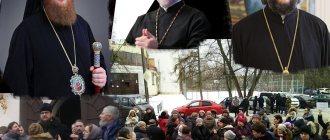The Sacrament of Love download fb2, epub free
This book is the most complete collection of conversations, sermons and dialogues of Metropolitan Anthony of Sourozh ever published. Metropolitan Anthony, a doctor by profession, is one of the most authoritative Orthodox theologians in the world, head of the diocese of the Russian Church in Great Britain. A significant part of the texts is published for the first time. The book includes an extensive introduction, photographs, extensive commentary, bibliography, an annotated index of names, and a subject index. The book is intended for the widest circle of readers: not only Orthodox, but everyone who wants and is ready to hear what the Orthodox Church has to say to modern man.
Information about the original source
When using library materials, a link to the source is required. When publishing materials on the Internet, a hyperlink is required:
Internet publication Electronic library “Metropolitan Anthony of Sourozh” (mitras.ru/).
The book “Man Before God” is compiled from the oral speeches of Metropolitan Anthony and covers the period from 1969 to 1991. These are conversations on the radio (in Russian BBC broadcasts) and in Moscow apartments during Bishop Anthony’s visits to Russia, as well as extra-liturgical conversations in a London parish during Lenten and Christmas retreats.
The conversations of Anthony of Sourozh are united by the general mood of standing before God. This book requires inner silence and slow reading: similar to the pauses that the Bishop himself made during conversations in his community.
The reader is offered a translation of Metropolitan Anthony’s book, “Learn to Pray,” approved by the author. "(School for Prauer). The translation was first published in the “Parish List” of the Assumption Cathedral in London in 1995-1996. The Russian reader could encounter this text in a “samizdat” translation, unfortunately far from perfect, called “School of Prayer.” The text was first published in English in 1970, has been reprinted several times in the UK and translated into dozens of languages. With the exception of some author's insertions, the chapters of the book correspond to the conversations that Bishop Anthony conducted during the week in Oxford from the steps of one of the university buildings. Here is what the Bishop himself tells about how the conversations that later formed the book arose:
The book is a collection of conversations and interviews, published mostly in periodicals in recent years. However, many of these publications have a small circulation (“Church and Time”, “Literator”) or are practically inaccessible to readers in Russia (“Bulletin of the Russian Western European Patriarchal Exarchate”). A few words about the “genre” of published texts. The Bishop never writes or prepares his speeches in advance. Such preparation is his entire life, entirely directed towards a single goal: to bring the Gospel of Christ to people. Texts are printed with minimal editorial changes in order to preserve this sound of a living word, addressed not to an impersonal audience, but to each individual person. The book opens with a lengthy autobiographical account of his early years. For those readers for whom this book is their first meeting with Metropolitan Anthony, we supplement it with a brief summary of the external milestones of his life.
We open the pages of the Gospel, and our minds again and again - for the umpteenth time! - are struck by the words of Jesus Christ: “I have come to bring down fire on the earth, and how I would like it to ignite already!” Even earlier it was said about Christ through the mouth of John the Baptist that He would baptize with fire. This, then, is the name of what Christ gives: fire. The faith of Christ is a fiery faith. This is the criterion.
But how can the news of fiery faith be convincing for the unbelieving world if it, this world, does not see fiery in those who call themselves believers? Where is the fire? Castles in the air of daydreaming on religious themes, airy speculations and theorizing, opinions and judgments about faith. The lukewarm water of pious emotions. The earthy heaviness of the so-called Orthodox way of life (what a word - “life”!). The fire will flare up for a moment, illuminate, warm - and go out again. But there are people in whom the fire burns, not extinguishing for a minute, palpable in their every word, in every look. A fire that cannot be faked when it is not there, but cannot be hidden when it is present.
This collection contains conversations of Metropolitan Anthony of Sourozh, dedicated to the most basic issues of Christian faith and life.
“Steps” is a wonderful gift for those people who, on their path to Christ, encounter various insurmountable stumbling blocks, almost “insoluble” contradictions, healed by a wise pastoral word filled with love and understanding.
This book includes several public conversations of Metropolitan. Anthony of Sourozh, which took place in the 1970s on British radio and television. The bishop’s interlocutors were journalists A.M. Goldberg and M. Lasky do not share his faith and beliefs. And yet communication turns out to be possible: conversation as a meeting, as recognition, as a desire to understand and hear each other. These conversations are an amazing example of a friendly dialogue between a believer and a non-believer on the most significant, most pressing issues.
Once on Mount Athos, I talked with Father Jerome about the unexpected internal changes that I felt in myself as I delved more and more into the teaching of the Orthodox Church. These changes and new sensations surprised and delighted me. While talking like this, I came to the idea that it would be useful to share this story of my “inner rebirth” with others someday. Father Jerome agreed, but added: “It is not suitable to publish this during your lifetime. But leaving behind a story about your conversion is very good. Many can benefit, and then you can’t suffer any mental harm from it.” Then he, smiling cheerfully and good-naturedly (which rarely happened to him), added: “Well, they will say, however, “what Jesuits are Athos: doctors, and even the current writer.”
The famous St. Petersburg writer and television journalist Ilya Stogov talks about the last hours of the earthly life of Jesus Christ and shares his thoughts about the Passion of Christ - the main event of world history. The book is illustrated with engravings by Albrecht Durer from the series “The Passion of the Lord” (1507–1512).
Christian stories for children
Exercise four
Each of us is not only the wretched creature that we discover when left alone with ourselves; we are also the image of God; and a child of God, capable of praying the most sublime prayers of the Church. I suggest that we add a little silence to the previous exercise, three or four minutes, and end with prayer:
“Help me, God, to see my own sins, never judge my neighbor, and all glory be to You!”
Before I start talking about unanswered prayers, I want to ask God to enlighten both me and you, because this is a difficult and vital topic. This is one of the great temptations, because of which it can be very difficult for beginners and even people with experience in prayer to pray to God. So often it seems to them that they are turning to an empty sky.
This often happens because their prayer is meaningless childishness. I remember an old man telling me that as a child he asked God for many months to give him the amazing ability that his uncle had - to take his teeth out of his mouth every evening and put them in a glass of water, and how happy he was later that God did not fulfill his desire. Often our prayers are as childish as this one, and, of course, they remain unfulfilled. When we pray for a fair wind for ourselves, we do not think about the fact that it may turn out to be a storm on the sea for others, and God will not grant a request that will bring harm to others.
In addition to these two obvious points, there is another side to the question: it happens that we pray to God for something that is worthy of being heard, and we are met with only silence - and silence is much more difficult to endure than refusal. If God says “no,” it will still be a positive reaction, and silence is, as it were, the absence of God, and it leads us to two temptations: when our prayer does not receive an answer, we doubt either God or ourselves. With God we doubt not His power, but His love. This is the first temptation.
And there is another temptation. We know that with faith the size of a mustard seed we could move mountains (Matt 17:20, Mark 9:23), and when we see that nothing is moving, we think: “Perhaps this means that Is my faith somehow untrue? This again is not true, and there is another answer to this: if you read the Gospel carefully, you will see that there is only one prayer in it that has not received an answer. This is the prayer of Christ in the Garden of Gethsemane. But at the same time we know that if ever in history God took part in someone who prayed, it was certainly in His Son before His death; and we know also that if ever there was an example of perfect faith, it was then. But God found that the faith of the Divine Sufferer was great enough to endure the silence.
God does not answer our prayers not only when they are unworthy, but also when He finds such greatness in us that He can trust us to remain faithful even in the face of His silence.
I remember one woman who was terminally ill; for many years she lived in a sense of the presence of God, and then suddenly felt His absence; she wrote to me then: “Please pray to God that I will never be tempted to create the illusion of His presence instead of accepting His absence.” Her faith was great. She was able to withstand this temptation, and God allowed her to experience His silence.








